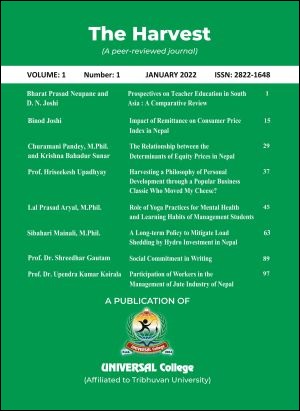A Long-term Policy to Mitigate Load Shedding by Hydro Investment in Nepal
DOI:
https://doi.org/10.3126/harvest.v1i1.44338Keywords:
hydro investment, load shedding, long-term policy, dynamic pricing policy, foreign direct investment, net present valueAbstract
Nepal has been facing acute load shedding problem though it has a large potential for hydropower generations. The load shedding, which increased significantly over the past decade, has hindered overall economic growth of the nation. Several previous researchers concluded that the load shedding problem can be abolished with the dynamic pricing policy in short-run. They do not talk much about long-term solution. However, the hypothesis of this study is that the foreign direct investment policy for deficit financing of hydropower projects can eradicate the capacity shortage, increase the electricity supply, and mitigates the load shedding problem in long-run.
As load shedding is a dynamic problem that requires analysis by dynamics models, Stella Architect software is used to analyze and find solutions to the problem. The research concludes that at least 9% of the deficit financing must be covered by the foreign direct investment to increase the hydro capacity and electricity supply to mitigate load shedding over the policy period in future. The net present value of profits of Nepal Electricity Authority, the organization with the full responsibility of the production and distribution of electricity in Nepal, with the foreign direct investment policy is almost doubled than without policy.




